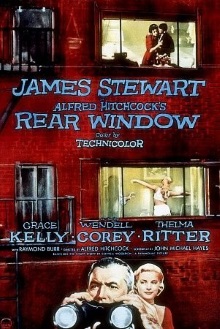
When ranking the best films of Alfred Hitchcock, Rear Window invariably makes the list alongside other greats like Vertigo and Psycho. It’s arguably the ur-film for an entire sub-genre of Peeping Tom movies with the traditional Hitchcockian ice blonde here being none other than the fabulous Grace Kelly while perennial favorite James Stewart is the protagonist.
As usual with Hitchcock, the film opens with an attention-grabbing shot. This time it’s an extended pan-and-zoom that takes in the entire cluster of apartment buildings and ending in the unit in which Stewart’s character, L.B. Jefferies, lives. As one Broken Forum regular commented, the shot is great example of visual storytelling. In less one minute, the audience is introduced all of the people who live in these apartments and learns about Jefferies’ life, that he is a photographer, that he lives alone, that he has been holed up due to a broken leg and so forth, all without a single line of dialogue. Since the weather is hot, everyone’s windows are open and so with nothing better to do during his convalescence Jefferies has taken to watching the daily routines of his neighbors.
One rainy night, after hearing a woman scream, Jefferies notices the salesman who lives across from him behaving suspiciously, repeatedly leaving and returning in the night with a large case. The next morning he sees that all of the blinds of that apartment are lowered and that the salesman’s wife, whom he had previously noticed was bed-ridden and quarreled with her husband, is now missing. He becomes convinced that the man has murdered his wife and feels compelled to keep watching. He tries to convince Lisa Fremont, the rich and beautiful model who loves him, of his theory and even brings in a police detective friend of his. So the question is whether his fears are justified or is he just jumping to conclusions?
The film’s theme of the illicit attraction of voyeurism and how it enthralls the audience just as much as the protagonist has since been thoroughly explored elsewhere, which detracts somewhat from the power of watching Rear Window for the first time in the present day. Still, it has to be said that Hitchcock executes it so perfectly that it’s no wonder that it’s lauded as one of the greatest films of all time. The whole film is shot solely from the perspective of Jefferies’ tiny apartment and he basically never moves from his wheelchair, yet it’s packed with all of the small but irresistible stories of each neighbor in addition to the main plot.
As usual, it’s also a gold mine of Hitchcock’s brand of Freudian psychology with Jefferies’ reaching for a huge telephoto lens when his pair of binoculars prove to be insufficient being an especially blatant reference. Then there’s how Lisa utterly fails to capture his interest until she plays along with his theory and how she has to act the part of a cat burglar in her elegant but impractical long, swirly skirt while he is trapped in his wheelchair, effectively emasculated. Normally I’m not a fan of these references, but Hitchcock is such a master of them that it’s impossible not to give him due credit for this.
The one thing I’m not a fan of is how it misleads the audience by showing a specific scene that Jefferies doesn’t see so that you spend the whole movie thinking that you know something Jefferies doesn’t but then pulls the rug from under you. That feel like a cheap and underhanded trick to add drama and doubt to otherwise be a straightforward as this film doesn’t really have a twist. I also think that Stewart looks so much older than Kelly that the relationship feels implausible. I do realize that Stewart looked even older than Kim Novak in Vertigo, but the difference in age actually makes sense there since their relationship was always implausible and in some sense unrealistic, thus heightening the tragedy of his character’s obsession with her.
Overall Rear Window clearly deserves its reputation as a top tier Hitchcock film and Grace Kelly is probably the most beautiful of his leading ladies. I also appreciate how clever and ahead of its time its conceit is. But to me its smaller, less ambitious scope makes it inferior to Vertigo in just about every respect.